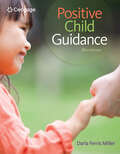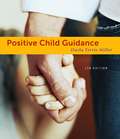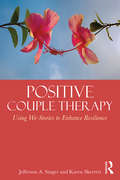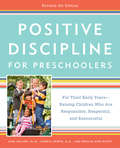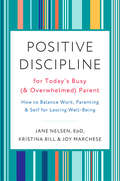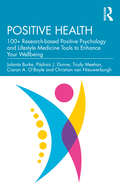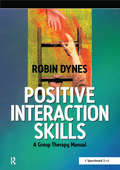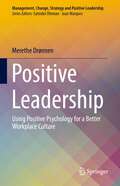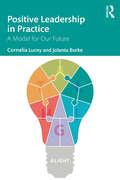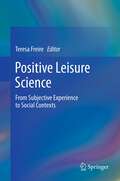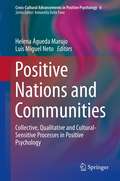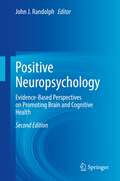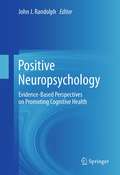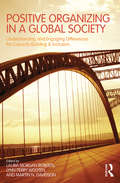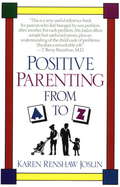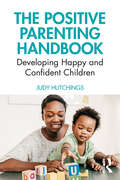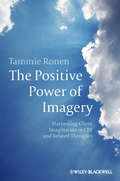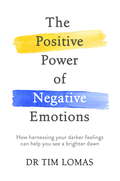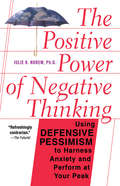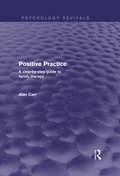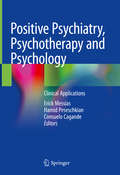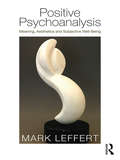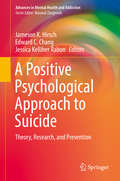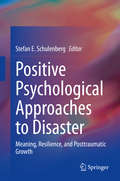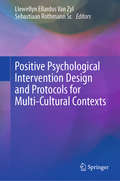- Table View
- List View
Positive Child Guidance
by Darla Ferris MillerPOSITIVE CHILD GUIDANCE, Eighth Edition, equips readers with information on how to guide, manage, and cope with the behavior of children. The book provides insight into children's efforts to understand their own emerging needs and feelings while coping with adult expectations. The author outlines workable steps for creating a cooperative, respectful community of children and adults, with special emphasis on sensitivity to cultural needs, cultural differences, and developmentally appropriate practice. You'll also find a range of practical, effective, and flexible guidance strategies based on principles of straightforward communication and assertiveness. This new edition includes critical advances in research and addresses the cultural trends that are changing the way babies and children are cared for today.
Positive Child Guidance (Seventh Edition)
by Darla Ferris MillerPositive Child Guidance, Seventh Edition is ideal for guidance, behavior management and discipline, and classroom management courses in an early childhood education curriculum. This practical book outlines workable steps for creating a cooperative, respectful community of children and adults with special emphasis on sensitivity to cultural needs, cultural differences, and developmentally appropriate practice.
Positive Couple Therapy: Using We-Stories to Enhance Resilience
by Jefferson A. Singer Karen SkerrettPositive Couple Therapy: Using We-Stories to Enhance Resilience is a significant step forward in the couple literature. Utilizing a strengths-based approach, it teaches therapists and couples a unique method for uncovering positive potential within a relationship. The authors demonstrate how “We stories”–created, recovered and made anew–provide essential elements of connection. With vivid imagery, these stories capture the couple’s sense of “We-ness,” highlighting memorable moments of compassion, acceptance, and respect. A shared commitment to the “We” simultaneously builds the relationship and enables each individual in the partnership to feel a greater degree of both accountability and autonomy. Couples that can find their stories, share them with each other, and then carry them forward to family, friends, and a larger community are likely to preserve a sense of mutuality that will thrive over a lifetime of partnership. Positive Couple Therapy provides simple and practical instruction for reclaiming positive stories that can catalyze hope in relationships that have become stressed and strained. The authors weave together cutting edge thinking and research in attachment theory, narrative therapy, neuroscience, and adult development, as well as their own research and clinical experience to present vivid case histories, step-by-step strategies, exercises, questionnaires, and interview techniques. They cover a range of contemporary couple experiences: couples in conflict, LGBT partnerships, deployed and discharged military couples, and couples at various points across the life span. The authors’ unique Me (to US) Scale, a 10-item tool that assesses the degree of mutuality a couple possesses at the start of treatment, gives therapists of any theoretical orientation the ability to put this intervention to immediate use.
Positive Discipline for Preschoolers, Revised 4th Edition: For Their Early Years -- Raising Children Who Are Responsible, Respectful, and Resourceful
by Jane Nelsen Cheryl Erwin Roslyn Ann DuffyCompletely updated with the latest research in child development and learning, Positive Discipline for Preschoolers will help parents understand their preschooler and provide early methods to raise a child who is responsible, respectful, and resourceful.Caring for young children is one of the most challenging tasks an adult will ever face. No matter how much you love your child, there will be moments filled with frustration, anger, and even desperation. There will also be questions: Why does my four-year-old deliberately lie to me? Why is everything a struggle with my three-year-old? Should I ever spank my preschooler when she is disobedient? Over the years, millions of parents have come to trust the Positive Discipline series and its common-sense approach to child-rearing.This revised and updated fourth edition includes a new chapter on the importance of play and outdoor experiences on child development, along with new information on school readiness, childhood brain growth, and social/emotional learning. You'll also find practical solutions for how to:- Teach appropriate social skills at an early age- Avoid the power struggles that often come with mastering sleeping, eating, and potty training- See misbehavior as an opportunity to teach nonpunitive discipline--not punishment
Positive Discipline for Today's Busy (and Overwhelmed) Parent: How to Balance Work, Parenting, and Self for Lasting Well-Being
by Jane Nelsen Kristina Bill Joy MarcheseWith the increasing pressure to excel at parenting, work, and personal relationships, it's easy to feel stressed and dissatisfied. This targeted Positive Discipline guide gives parents the tools to parent effectively without sacrificing their well-being or giving up on their life goals. Instead of creating unachievable expectations, you will instead learn to play to your strengths at work and at home. You’ll integrate your seemingly disparate areas of life and use Positive Discipline to make the most out of your time, energy and relationships. By helping you get to the bottom of the underlying causes of misbehavior, busy parents will also be able to avoid pampering and keep permissive and punitive parenting at bay. Instead of feeling fragmented and guilty, you’ll have the presence of mind to explore what works best for you and your family. Attitude is key – we’ll help you feel confident in your parenting abilities and your professional choices, making your children more likely to adopt an attitude of self-reliance and cooperation. Armed with communication strategies and tips for self-reflection, moms (and dads!) won't have to feel guilty about leaving their child with a sitter during the day, or leaving work early to go to a soccer game.
Positive Health: 100+ Research-based Positive Psychology and Lifestyle Medicine Tools to Enhance Your Wellbeing
by Jolanta Burke Pádraic J. Dunne Trudy Meehan Ciaran A. O’Boyle Christian van NieuwerburghThis comprehensive compendium offers a wealth of research-informed tools that can boost both physical and mental wellbeing throughout the lifespan. Filled with more than 100 activities to help you live life better, this book is the first of its kind to integrate the latest research from the fields of positive psychology and lifestyle medicine. Striking a careful balance between theory and practice, the book first reviews what is known about positive psychology and health, presenting a novel approach to holistic wellbeing. It then goes on to provide more than 100 tools designed to increase physical, mental and social health and wellbeing, and also to decrease the risk of illness and disease. The tools described can be used by people of all ages, whether well or experiencing illness. It includes tools that you can use to improve your nutrition and sleep, to increase your physical activity, to develop positive relationships, to develop a positive mindset and to pursue a meaning in life. These tools provide research-informed, practical advice to help you to make lasting changes and become the best possible version of yourself. This book is invaluable for anyone who wishes to maintain and enhance their health and wellbeing using tools that have been shown through research to be effective. It is also a key text for students in positive psychology and healthcare, as well serving as an evidence-based reference book for coaches and health professionals who wish to recommend research-informed tools to their clients and patients.
Positive Interaction Skills: A Group Therapy Manual
by Robin DynesThis practical, photocopiable manual provides group leaders with a flexible programme to teach interaction skills that can be adapted to a wide variety of groups, situations and needs. The programme will benefit anyone who lacks adequate skills or who has difficulty interacting with other people at home, socially or at work, for example adults with very few or no formal qualifications, people with depression or schizophrenia, young people in schools or people with learning disabilities. The book is filled with workable ideas and the sessions are designed to be used independently as required to meet identified needs. Full guidance notes for facilitators, session plans, handouts and activity guidelines are provided and this will be an invaluable resource for anyone wanting to run an interaction skills programme.
Positive Leadership: Using Positive Psychology for a Better Workplace Culture (Management, Change, Strategy and Positive Leadership)
by Merethe DrønnenThis book demonstrates how leaders can use research from positive psychology to increase work engagement and wellbeing, improve relationships, and increase performance and productivity in the workplace. Specifically, it teaches leaders how to use psychology to understand their own contributions to their leadership style as well as to understand how their employees are being motivated to increase their engagement and productivity. Suitable for leaders, human resource personnel, consultants and coaches, this book gives research-based theory and insight into how leaders’ own attitudes, mind-sets and authenticity are influencing their employees level of performance, emotions and creativity. Readers learn how to motivate, bring meaning into the workplace, improve communication and relationships as well as how to use strength-based leadership. The book features examples from successful companies like Microsoft, Google and Disney and provides practical interventions and techniques in every chapter that can immediately be implemented into the workplace.
Positive Leadership in Practice: A Model for Our Future
by Cornelia Lucey Jolanta BurkeThis book aims to help leaders become the best versions of themselves, achieve extraordinary results, and help their team accomplish the same. Packed with research and practical advice from real-life positive leaders, it offers an extensive look into both what high-performance leadership is and how it can be achieved. Positive Leadership in Practice is a resource that all leaders can tap into to be more effective. The book introduces an ALIGHT model that guides leaders through six fundamental resources that can alight their own and their team’s motivation and transform their performance to an extraordinary level. Further breaking down the six resources into 18 core components, the book expands on what constitutes the six resources to make them tangible and accessible. The book also offers leaders the opportunity to self-assess their own levels of resources and levels of positive leadership through a questionnaire, as well as opportunities to reflect on how to further develop these levels of resources and positive leadership. Finally, the book signposts practical strategies to tap into on the back of their reflections to take action to become their best possible positive leader. This book is for existing and aspiring managers, leaders, and those with people-related roles such as in human resources, coaching, leadership development, and organisational consultants, as well as anyone in more informal leadership positions. After all, we are all leaders.
Positive Leisure Science
by Teresa FreireThis book extends positive psychology by embedding leisure into the positive science field, following a new paradigm and aggregating various domains and fields. Positive science can be applied to the field of leisure and, in turn, leisure can serve as an arena to study some of the most important optimal functioning variables. The book presents knowledge on a diverse range of topics about optimizing socio-cognitive processes and behaviors, places and contexts, societies and cultures through leisure. These topics are unified by an underlying continuum that extends from individuals and subjective experiences to social worlds. The contributions highlight components of everyday life, showing that subjective experience and life trajectories are structured and social goals and life purposes are defined and achieved within interactions between individuals and their lived contexts and environments in daily life. .
Positive Nations and Communities: Collective, Qualitative and Cultural-Sensitive Processes in Positive Psychology
by Luis Miguel Neto Helena Águeda MarujoThis book approaches the field of positive psychology from a post-modern perspective. It explores the consequences of combining current trends and models with supplementary participatory and transformative methods. The book brings a more collective, qualitative, culturally sensitive and transformative approach to the processes of making sense and implementing the science of positive psychology. It moves beyond the individual level towards a "knowledge community" and "knowledge of the communities". The book is an invitation to more participatory and polyphonic dialogues in the field of positive psychology.
Positive Neuropsychology: Evidence-Based Perspectives on Promoting Brain and Cognitive Health
by John J. RandolphPositive psychology—the study and promotion of character strengths, positive emotion, optimism, and resilience—has gained considerable momentum and support over the last 20 years. More recently, neuropsychology has begun to embrace related perspectives. In the first edition of Positive Neuropsychology, an extensive collection of perspectives from national leaders in neuropsychology clarified the importance of promoting cognitive health through various means. The present edition expands on the first edition, with four new chapters and updates of all previous chapters. Topics include the importance of physical, social, and intellectual engagement across the lifespan; nutrition and brain health; novel technologies used to maintain brain health and functional independence; compensating for and preventing cognitive limitations; and strategies to promote brain health in clinical and other settings. Chapters reveal not only the benefits of understanding cognitive health and optimal outcomes across the lifespan, but also emerging avenues for practitioners to expand their work into non-traditional settings. Bringing new dimensions to the neuroscience, wellness, and positive psychology literatures, Positive Neuropsychology will interest a wide range of academics and clinicians, including neuropsychologists, clinical and health psychologists, geriatricians, primary care physicians, cognitive neuroscientists, and other healthcare professionals.
Positive Neuropsychology
by John J. RandolphPsychology and many of its subfields have seen a significant shift over the past 10-12 years toward a focus on hope, positive attributes, and character strengths through the positive psychology movement. This book provides a blueprint for a burgeoning subfield in neuropsychology--positive neuropsychology. It proposes an alternative, evidence-based perspective on neuropsychology that incorporates positive psychology principles and a focus on promotion of cognitive health. It synthesizes existing research and provides novel perspectives on promotion of cognitive health in clinical, nonclinical, and academic settings. This work is a resource and reference for neuropsychologists, allied professionals, and students who see the critical role neuropsychologists can play in maintaining, promoting, and being mindful of cognitive health. TARGETED MARKET SEGMENTS Neuropsychologists, health psychologists, geriatricians, rehabilitation specialists, clinical psychologists
Positive Organizing in a Global Society: Understanding and Engaging Differences for Capacity Building and Inclusion
by Martin N. Davidson Laura Morgan Roberts Lynn Perry WootenThis book unites the latest research in diversity, inclusion, and positive organizational scholarship (POS), to investigate diversity and inclusion dynamics in social systems. Comprised of succinct chapters from thought leaders in the field, this book covers both micro- and macro-levels of analysis, covering topics such as authenticity, mentorship, intersectional identity work, positive deviance, resilience, resource cultivation and utilization, boundary-spanning leadership, strengths-based development, positive workplace interventions to promote well-being, inclusive strategic planning, and the role of diversity in innovation.
Positive Parenting from A to Z
by Karen Renshaw Joslin"A valuable book for the busy parent. Karen Joslin knows how to use both love and power in parenting, and presents easily understood solutions to common problems." GLENN AUSTIN, M.D., F.A.A.P.Former President, American Academy of PediatricsParenting expert and mother Karen Renshaw Joslin provides concrete age-specific solutions to more than 140 child misbehaviors. With this reassuring guide, alphabetically organized for easy access, you can: look up the problem and immediately pinpoint the case, learn specfically what to do, according to your child's age, know the exact words to say with actual dialogue examples, and more.From the Trade Paperback edition.
The Positive Parenting Handbook: Developing happy and confident children
by Judy HutchingsDrawing on Judy Hutchings many years of work with parents and children, The Positive Parenting Handbook is a concise, straightforward guide that offers simple solutions to daily dilemmas. The clear and easy advice provides parents with skills and tools that support positive parent/child relationships for happy and confident children. It explains common behaviour problems in young children and offers expert advice on: -How to build strong bonds and let children know they are important to you -How to encourage behaviour we want to see through praise and small rewards -Giving instructions that children are more likely to follow -How ignoring some unwanted behaviours can be helpful -Strategies for managing difficult behaviour -Teaching new behaviour to our children -Developing children’s language. It includes six case studies of how these strategies have helped real families with everyday problems at bedtime and mealtimes, during toilet training, out shopping and when children experience anxiety. Together with suggestions of other useful books and information sources, The Positive Parenting Handbook is ideal for all parents, including those of children with diagnosed developmental difficulties, and the range of professionals who work with them.
The Positive Power of Imagery
by Tammie RonenThe Positive Power of Imagerypresents the theory and practice of imagery therapy as a creative intervention that challenges therapists to learn the skills for creatively designing personalized exercises to match clients' specific needs, problems, and personalities.Presents a unique integration of imagery therapy with CBT and positive psychologyChallenges therapists to develop imagery therapy techniques tailored to fit their individual clients' personalities and problemsFeatures case illustrations and guidelines for the use of imagery and metaphors for both adults and children
The Positive Power of Negative Emotions: How harnessing your darker feelings can help you see a brighter dawn
by Dr Tim LomasThe pursuit of happiness is universal. Most of us would like to experience more joy and elation, but when we feel like we are falling short of this ideal, we can often feel downcast. We may even see 'darker' emotional states, like anger and envy, as character defects or serious illnesses.In The Positive Power of Negative Emotions, Dr Tim Lomas reveals that these 'negative' feelings are not only normal and natural, but may in fact serve as pathways to the very happiness and flourishing that we seek. Anger can signal that you've been treated unfairly and push you towards change. Guilt suggests that you have let yourself down, and drives you to be better. Envy can motivate you to improve yourself and your life. Boredom can be a gateway to creativity and self-transcendence. Loneliness allows your authentic voice to be heard, and teaches self-sufficiency. The Positive Power of Negative Emotions will be your guide to using your darker feelings to discover what you really want and the person you want to be. It will radically change the way you think about your emotional life, and empower you to use your negative feelings in positive ways.
The Positive Power of Negative Thinking: Using Defensive Pessimism to Harness Anxiety and Perform at Your Peak
by Julie K. NoremHow often are we urged to "look on the bright side"? From Norman Vincent Peale to the ubiquitous smiley face, optimism has become an essential part of American society. In this long-overdue book, psychologist Julie Norem offers convincing evidence that, for many people, positive thinking is an ineffective strategy--and often an obstacle--for successfully coping with the anxieties and pressures of modern life. Drawing on her own research and many vivid case histories, Norem provides evidence of the powerful benefits of "defensive pessimism," which has helped millions to manage anxiety and perform their best work.
Positive Practice: A Step-by-Step Guide to Family Therapy (Psychology Revivals)
by Alan CarrOriginally published in 1995 Positive Practice is for newcomers to the field of family therapy and systemic consultation including professionals from a variety of disciplines, such as psychology, psychiatry, social work, nursing, child care and protection, occupational therapy, paediatrics and general medical practice. Positive Practice is a step-by-step approach to family therapy written both as a treatment manual and as a training resource. It describes in detail a unique approach to consulting to families with youngsters who have psychological or social problems. It covers the difficulties associated with planning the first consultation, strategies for family assessment and problem formulation, methods for developing a therapeutic contract and goal setting, plans for conducting therapy and troubleshooting resistance, and ways of concluding therapy. It includes many diagrams and checklists and is essentially jargon-free. Practical exercises are given at the end of each chapter, making it an ideal training resource for any introductory course. Special issues discussed include adjunctive individual sessions, convening network meetings, jointly managing statutory and therapeutic responsibilities, ethical decision making, clinical audit and professional development. An integrative formulation model provides a focus for both guiding assessment and planning therapy. The approach to practice described in this book offers clinicians a way to integrate new ideas from the burgeoning literature on family therapy, theory and research into their clinical work.
Positive Psychiatry, Psychotherapy and Psychology: Clinical Applications
by Erick Messias Hamid Peseschkian Consuelo CagandeFor hundreds of years, psychology has looked into the dysfunctions and symptoms of the mind. It’s only over the last few decades that the field has started to pay attention to what constitutes a functional and content life. Instead of using disease to understand health, positive psychology studies the components of a good life and helps people not only avoid mental health problems but develop happiness. The work done in positive psychology is now at a point where applications are being developed in positive psychotherapy and extended to those with psychiatric diagnoses in positive psychiatry. While these fields are a recent development they hold the promise of helping all of us live a fulfilled life. Medicine in general, and psychiatry in particular, suffers from a worldview that is symptom- and deficit-oriented. By adopting a positive approach, psychology, psychotherapy, and psychiatry add a more holistic, integrative, resource oriented, and preventive perspective. There is great urgency in developing resources and potentials in our patients, not only freeing them from their disorders. Psychiatrists and psychotherapists alike are incorporating these positive tools into their practices with positive clinical outcomes. Standing on the shoulders of pioneers like Nossrat Peseschkian, in positive psychotherapy, and Dilip Jeste, in positive psychiatry, this textbook is the first to bring together these innovations in one volume that will serve as an excellent resource for medical professionals looking to reap the benefits gained by the studies in these areas. Currently, the majority of texts that are available are targeting psychologists and researchers, whereas this book seeks to use positive psychology as the foundation on which the clinical applications are built. As such, this book will be of interest to psychiatrists, psychologists, social workers, and other mental health professionals. It may be used in educating a new generation of mental health professionals in these tenets that are expanding the reach of psychology, the practice of psychotherapy, and the scope of psychiatry.
Positive Psychoanalysis: Meaning, Aesthetics and Subjective Well-Being
by Mark LeffertPsychoanalysis and Psychotherapy have, in one way or another, focused on the amelioration of the negative. This has only done half the job; the other half being to actively bring Positive Experience into patients’ lives. Positive Psychoanalysis moves away from this traditional focus on negative experience and problems, and instead looks at what makes for a positive life experience, bringing a new clinical piece to what psychoanalysts do: Positive Psychoanalysis and the interdisciplinary theory and research behind it. The envelope of functions entailed in Positive Psychoanalysis is an area of Being described as Subjective Well-Being. This book identifies three particular areas of function encompassed by SWB: Personal Meaning, Aesthetics, and Desire. Mark Leffert looks at the importance of these factors in our positive experiences in everyday life, and how they are manifested in clinical psychoanalytic work. These domains of Being form the basis of chapters, each comprising an interdisciplinary discussion integrating many strands of research and argument. Leffert discusses how the areas interact with each other and how they come to bear on the care, healing, and cure that are the usual subjects of psychoanalytic treatment. He also explores how they can be represented in contemporary psychoanalytic theory. This novel work discusses and integrates research findings, phenomenology, and psychoanalytic thought that have not yet been considered together. It seeks to inform readers about these subjects and demonstrates, with clinical examples, how to incorporate them into their clinical work with the negative, helping patients not just to heal the negative but also move into essential positive aspects of living: a sense of personal meaning, aesthetic competence, and becoming a desiring being that experiences Subjective Well-Being. Drawing on ideas from across neuroscience, philosophy, and social and culture studies, this book sets out a new agenda for covering the positive in psychoanalysis. Positive Psychoanalysis will appeal to psychoanalysts and psychotherapists, neuroscientists and philosophers, as well as academics across these fields and in psychiatry, comparative literature, and literature and the mind.
A Positive Psychological Approach to Suicide: Theory, Research, And Prevention (Advances in Mental Health and Addiction)
by Jameson K. Hirsch Edward C. Chang Jessica Kelliher RabonThis inspiring resource presents theories, findings, and interventions from Positive Suicidology, an emerging strengths-based approach to suicide prevention. Its synthesis of positive psychology and suicidology theories offers a science-based framework for promoting wellbeing to complement or, if appropriate, replace traditional deficit-driven theories and therapies used in reducing suicidal thoughts and behaviors. Coverage reviews interpersonal, intrapersonal, and societal risk factors for suicide, and identifies protective factors, such as hope and resilience, that can be enhanced in therapy. From there, chapters detail a palette of approaches and applications of Positive Suicidology, from the powerful motivating forces described in Self-Determination Theory to meaning-building physical and social activities. <P><P> Among the topics covered: <P><P> Future-oriented constructs and their role in suicidal ideation and enactment. <br>Gratitude as a protective factor for suicidal ideation and behavior: theory and evidence.- <br>Considering race and ethnicity in the use of positive psychological approaches to suicide. <br>The Six R’s framework as mindfulness for suicide prevention. <br>Community-based participatory research and empowerment for suicide prevention. <br>Applied resiliency and suicide prevention: a strengths-based, risk-reduction framework. <P><P>Psychotherapists, counselors, social workers, psychiatrists, and health psychologists, as well as educators, clergy and healthcare professionals, will find A Positive Psychological Approach to Suicide an invaluable source of contemporary evidence-based strategies for their prevention and intervention efforts with suicidal clients.
Positive Psychological Approaches to Disaster: Meaning, Resilience, and Posttraumatic Growth
by Stefan E. SchulenbergWritten by prominent proponents of disaster mental health and/or positive psychology, this comprehensive book examines disaster mental health and positive psychology in the context of natural and technological disasters. Chapters in the first section focus on applications of meaning and resilience in the area of disaster mental health, both serving as primary examples of applications of positive psychology and related frameworks. Later chapters focus more specifically on key aspects of disaster mental health, including the importance of preparedness, training, and special populations. Contributors consistently align their insights with positive psychological approaches, either by explicitly referencing their relevance or alluding less directly to themes in positive psychology.Among the topics discussed:The role of religion and spirituality in finding meaning after disastersVeterans and disaster response workFirefighters: an occupational case study of resilienceStrategies for responding to adolescents following natural and technological disastersEffective crisis response for facilitating posttraumatic growthPositive Psychological Approaches to Disaster: Meaning, Resilience, and Posttraumatic Growth is a significant and timely collection of research, representing an effort of internationally respected scholars in positive psychology and disaster mental health.
Positive Psychological Intervention Design and Protocols for Multi-Cultural Contexts
by Llewellyn Ellardus Van Zyl Sebastiaan RothmannThis volume presents innovative and contemporary methodologies and intervention protocols for the enhancement of positive psychological attributes in multicultural professional and organizational contexts. Most methods, models and approaches that underpin positive psychological interventions are confined to clinical samples, closed systems or monocultural contexts, which restrict their applicability to particular contexts. Extensive practical intervention protocols, designs and methods which usually accompany first draft intervention papers are condensed into brief paragraphs in final manuscripts or removed in their entirety. This, in turn, reduces their potential for replicability or adoption by consumers, practitioners, or industry. This volume develops guidelines for enhancing positive psychological attributes, such as positive moods (e.g. positive affect; life satisfaction), strengths (e.g. gratitude; humour), cognitions (e.g. hope; optimism) and behaviours (e.g. emotional regulation; positive relationship building) within various multicultural contexts. Thereby, it shows how positive psychology interventions can be replicated to a wide-range of contexts beyond those in which they were developed.
